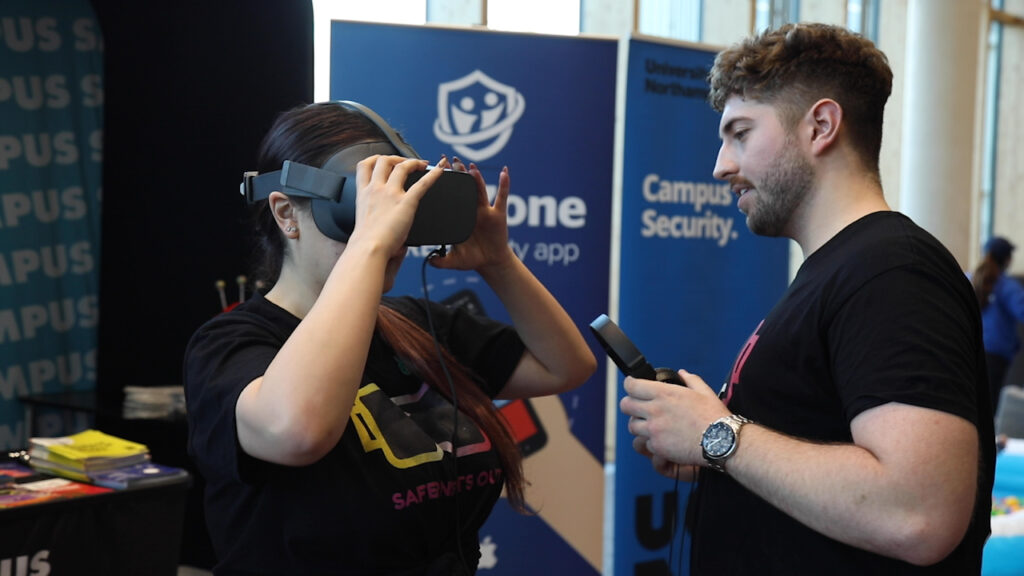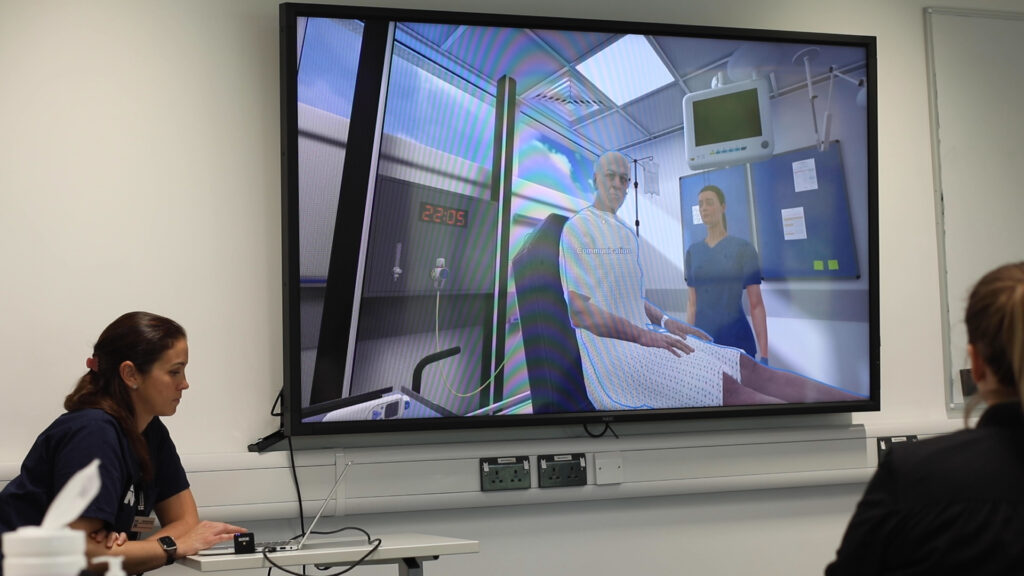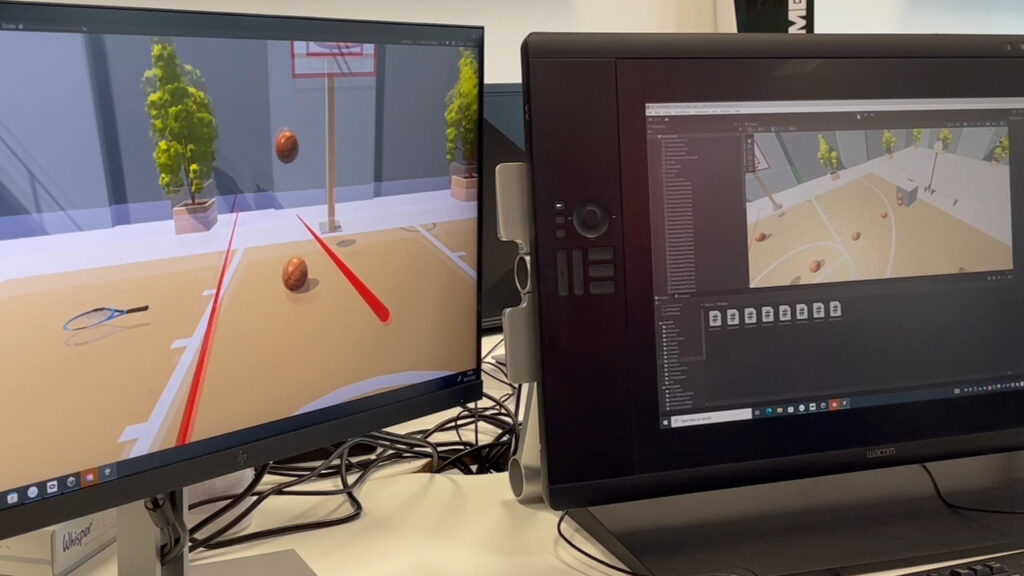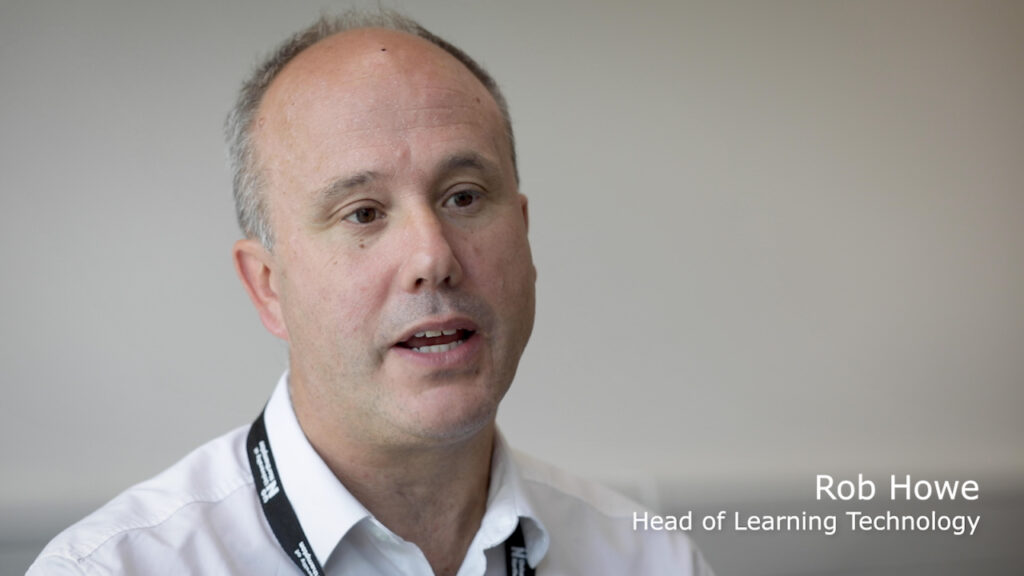Virtual reality (VR) and augmented reality (AR) are quickly gaining traction at the University as effective technologies for teaching and learning.
With VR in particular, it is tempting to imagine a world in which students fit their headsets for a complete University experience. However, as these four films show the reality is more interesting at UON with academics exploring how these technologies can be used in a wide range of creative ways in the classroom.
The first film explores how in 2022-23 Senior Lecturer in Marketing Kardi Somerfield worked with the Police Fire and Commissioners office on a live VR brief to create a virtual reality scenario to promote safer student experiences in Northampton.
(Click the images or text links below to launch the videos in a new tab)

Video: Interview with Kardi Somerfield – Safer Northampton VR Project Duration: 3.55
Using a RiVR Link system the Second-year Digital Marketing students conceptualised, planned, recorded, edited, and released their unique VR experience with accompanying branding including flyers, T-shirts, and signage.
The project was launched to widespread acclaim and media attention, providing the students with highly valuable digital skills. It is an exemplar of how VR technologies can be used creatively as content creation tools in subject areas that are non-technical.
The second film looks at how the subject area of Health is using VR and XR technologies. Sims Lead Kate Ewing and Nursing Senior Lecturer Hannah Cannon discuss how VR software is helping to develop nursing students’ critical skills through the use of interactive hospital scenarios. The simulation tools are used in combination with debriefing discussions that provide rich learning experiences matching the tutor’s individual learning outcomes.

Video: Interview with Kate Ewing and Hannah Cannon on Developing Health Simulations. Duration: 7.41
Our next video case study focuses on how Senior Lecturer in Games Design David Nicholls works with his students to create prototype VR games. He discusses how VR and XR are areas that are both very popular with students and have huge potential for their future employability. So much so, that he is currently collaborating on the development of VR projects across multiple subject areas within the University.

Video: Interview with David Nicholls on use of VR in Games Design. Duration: 2.17
And finally, the last film in this series looks at how the University’s CENTRE FOR ACTIVE DIGITAL EDUCATION (CADE) has launched a number of Special Interests Groups (SIGs) for new technologies such as XR (including MR, VR and AR), Artificial Intelligence (AI), Distance Learning (DL) and Game-Based Learning (GBL).

Video: Interview with Rob Howe on CADE and VR special interest groups. Duration 2.42
Head of Learning Technology Rob Howe explains that CADE is a platform for creative discussion on the teaching and learning opportunities afforded by these extended reality technologies, and how by taking a strategic approach to the development of XR and working collaboratively more students and staff will benefit from our expanding expertise in this area.
For more details on the CENTRE FOR ACTIVE DIGITAL EDUCATION (CADE) and to join the discussions please see: https://www.northampton.ac.uk/research/research-institutes-and-centres/centre-for-active-digital-education-cade/
Presentation at: Teaching and supporting a digital future: UoN Showcase 4th February 2022
Kardi Somerfield Senior Lecturer & Course Leader BA Advertising & Digital Marketing, FBL.
Live client project: Building and promoting a Virtual Reality experience for the Campus Security/Police as part of Safer Nights Out Campaign. Using RiVR Classroom in a Box. The promotional video is also available to view.
The recording of the event is available to view

Sally Sun from Faculty of Business and Law has kindly reflected on her experiences of Hybrid / Flexible Learning on the module BUS1004 (Introduction to Management).
She notes ‘…this is a case study about my practices of teaching students online and F2F at the same time during March 2020. I feel that I have adopted some teaching practices which are very similar to what is suggested in the HyFlex teaching approach, so this is my reflection about my experiences of what went well and what can be improved. This reflection is designed around Gibb’s reflection cycle to help me focus on my experiences.’
4 key points were noted by Sally regarding her experiences:
- The new delivery format has satisfied the needs of a certain kind of students
- Students got excited when they interact with students online
- She felt extremely exhausted after the session
- She felt the teaching quality was not her best level for F2F students in the class
The University is continuing to refine hyflex models and share experiences on when this works well, how it can be refined and when other methods of delivery may be more appropriate.
For more information on socially distanced delivery then please see the Learntech blog
If you have other experiences to share then please email rob.howe@northampton.ac.uk
Recent Posts
- Blackboard Upgrade – February 2026
- Blackboard Upgrade – January 2026
- Spotlight on Excellence: Bringing AI Conversations into Management Learning
- Blackboard Upgrade – December 2025
- Preparing for your Physiotherapy Apprenticeship Programme (PREP-PAP) by Fiona Barrett and Anna Smith
- Blackboard Upgrade – November 2025
- Fix Your Content Day 2025
- Blackboard Upgrade – October 2025
- Blackboard Upgrade – September 2025
- The potential student benefits of staying engaged with learning and teaching material
Tags
ABL Practitioner Stories Academic Skills Accessibility Active Blended Learning (ABL) ADE AI Artificial Intelligence Assessment Design Assessment Tools Blackboard Blackboard Learn Blackboard Upgrade Blended Learning Blogs CAIeRO Collaborate Collaboration Distance Learning Feedback FHES Flipped Learning iNorthampton iPad Kaltura Learner Experience MALT Mobile Newsletter NILE NILE Ultra Outside the box Panopto Presentations Quality Reflection SHED Submitting and Grading Electronically (SaGE) Turnitin Ultra Ultra Upgrade Update Updates Video Waterside XerteArchives
Site Admin

